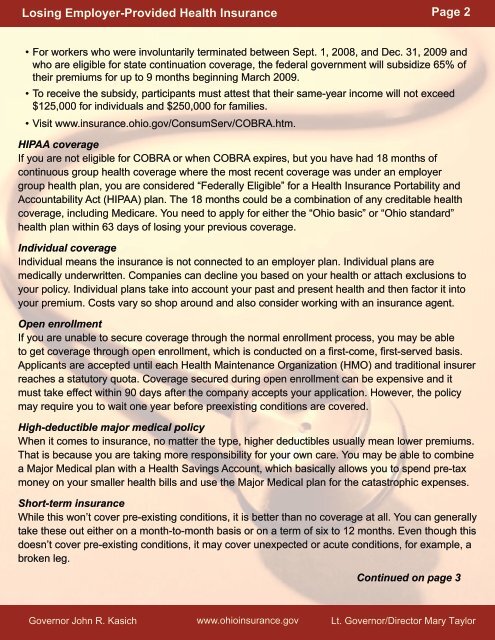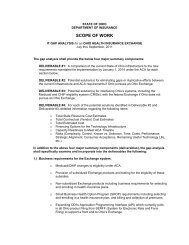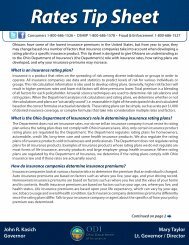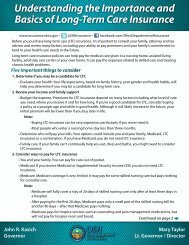Losing Employer-Provided Health Insurance - Ohio Department of ...
Losing Employer-Provided Health Insurance - Ohio Department of ...
Losing Employer-Provided Health Insurance - Ohio Department of ...
You also want an ePaper? Increase the reach of your titles
YUMPU automatically turns print PDFs into web optimized ePapers that Google loves.
<strong>Losing</strong> <strong>Employer</strong>-<strong>Provided</strong> <strong>Health</strong> <strong>Insurance</strong> Page 2<br />
• For workers who were involuntarily terminated between Sept. 1, 2008, and Dec. 31, 2009 and<br />
who are eligible for state continuation coverage, the federal government will subsidize 65% <strong>of</strong><br />
their premiums for up to 9 months beginning March 2009.<br />
• To receive the subsidy, participants must attest that their same-year income will not exceed<br />
$125,000 for individuals and $250,000 for families.<br />
• Visit www.insurance.ohio.gov/ConsumServ/COBRA.htm.<br />
HIPAA coverage<br />
If you are not eligible for COBRA or when COBRA expires, but you have had 18 months <strong>of</strong><br />
continuous group health coverage where the most recent coverage was under an employer<br />
group health plan, you are considered “Federally Eligible” for a <strong>Health</strong> <strong>Insurance</strong> Portability and<br />
Accountability Act (HIPAA) plan. The 18 months could be a combination <strong>of</strong> any creditable health<br />
coverage, including Medicare. You need to apply for either the “<strong>Ohio</strong> basic” or “<strong>Ohio</strong> standard”<br />
health plan within 63 days <strong>of</strong> losing your previous coverage.<br />
Individual coverage<br />
Individual means the insurance is not connected to an employer plan. Individual plans are<br />
medically underwritten. Companies can decline you based on your health or attach exclusions to<br />
your policy. Individual plans take into account your past and present health and then factor it into<br />
your premium. Costs vary so shop around and also consider working with an insurance agent.<br />
Open enrollment<br />
If you are unable to secure coverage through the normal enrollment process, you may be able<br />
to get coverage through open enrollment, which is conducted on a first-come, first-served basis.<br />
Applicants are accepted until each <strong>Health</strong> Maintenance Organization (HMO) and traditional insurer<br />
reaches a statutory quota. Coverage secured during open enrollment can be expensive and it<br />
must take effect within 90 days after the company accepts your application. However, the policy<br />
may require you to wait one year before preexisting conditions are covered.<br />
High-deductible major medical policy<br />
When it comes to insurance, no matter the type, higher deductibles usually mean lower premiums.<br />
That is because you are taking more responsibility for your own care. You may be able to combine<br />
a Major Medical plan with a <strong>Health</strong> Savings Account, which basically allows you to spend pre-tax<br />
money on your smaller health bills and use the Major Medical plan for the catastrophic expenses.<br />
Short-term insurance<br />
While this won’t cover pre-existing conditions, it is better than no coverage at all. You can generally<br />
take these out either on a month-to-month basis or on a term <strong>of</strong> six to 12 months. Even though this<br />
doesn’t cover pre-existing conditions, it may cover unexpected or acute conditions, for example, a<br />
broken leg.<br />
Continued on page 3<br />
Governor John R. Kasich<br />
www.ohioinsurance.gov<br />
Lt. Governor/Director Mary Taylor
















